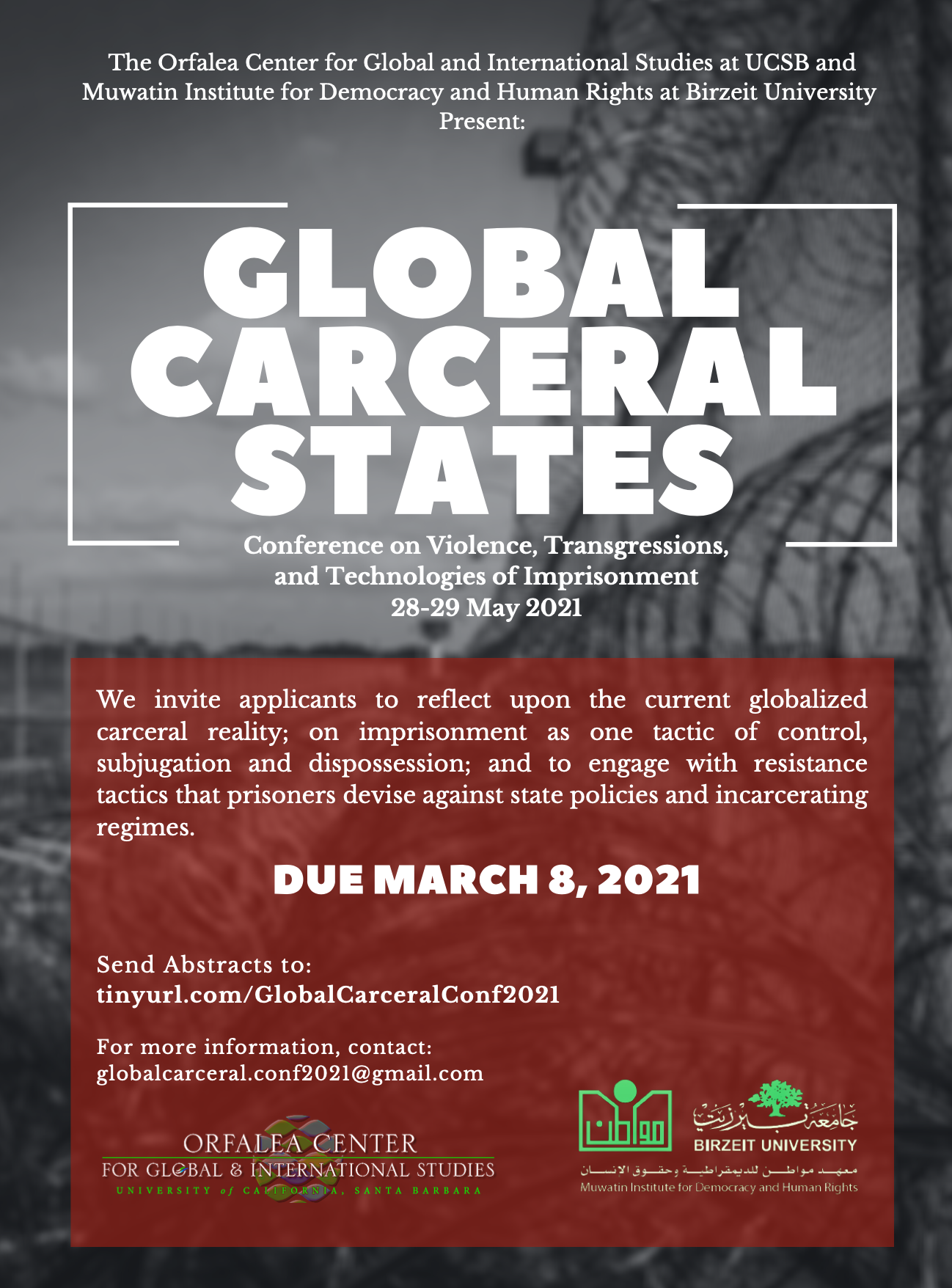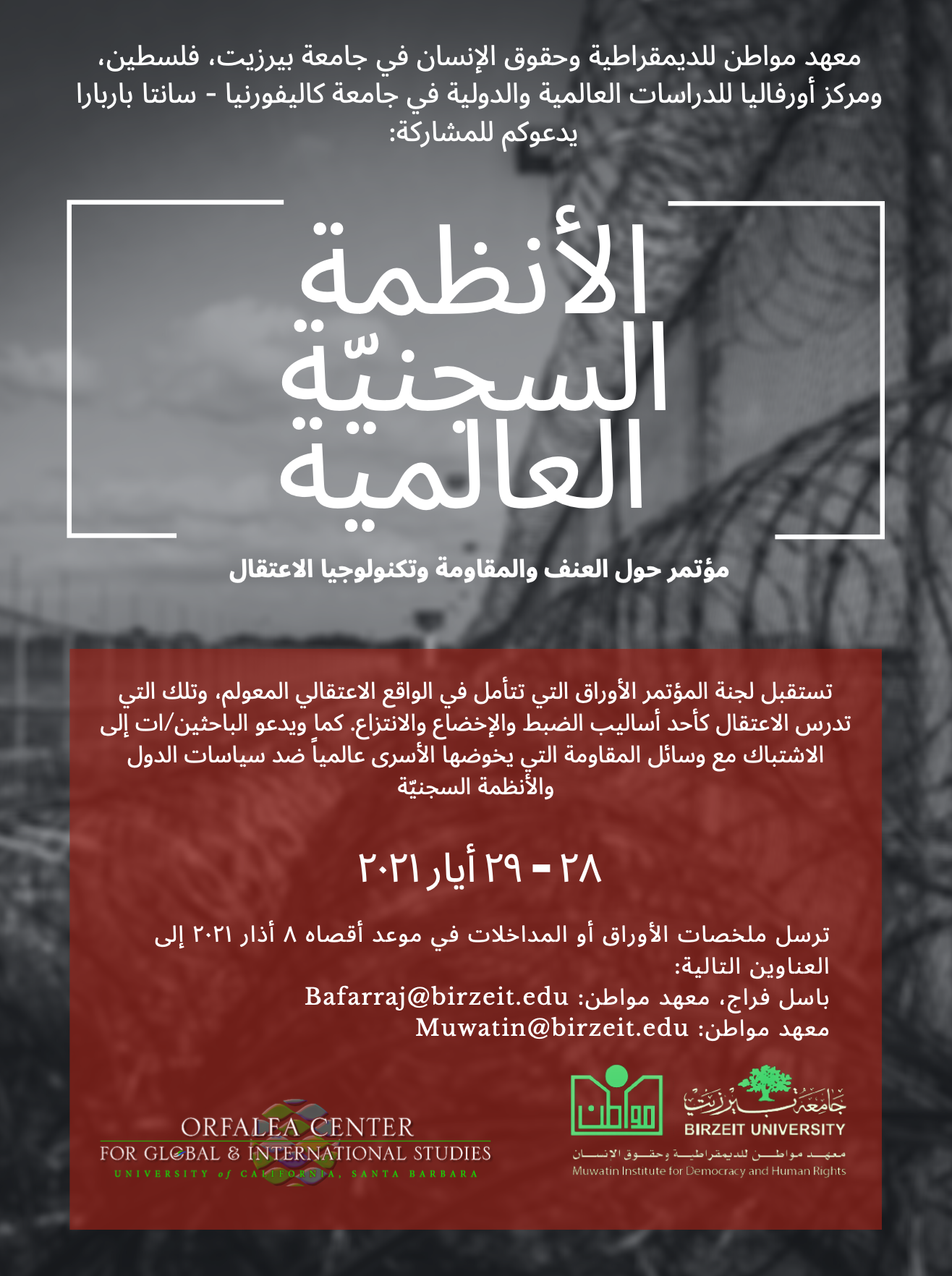[The following is a call for proposals for a conference titled "Global Carceral States: Violence, Transgressions, and Technologies of Imprisonment" set to take place virtually on 28 and 29 May 2021. Scroll down to read the call in Arabic. Click here to submit a proposal.]
Prisons are a central feature of the lives of millions around the world, and many people are dealing with memories and traumas related to their own imprisonment and/or that of members of their families or communities. Imprisonment remains a central tactic for managing and confining members of populations deemed to be risky, hostile, or superfluous. Techniques of imprisonment are constantly developed, modified and shared, and incarcerated populations continue to be at the receiving end of ever-changing modes of torture and violence. Carcerality, however, is not restricted to the confines of prisons and carceral realities are lived through -amongst others- technologies of surveillance, the erection of bonders and walls, and the ramifications of wars.
Carceralized populations, on the other hand, continue to respond in a multitude of ways to the punitive powers exercised upon them by ruling regimes. Prisoners have long engaged in tactics of resistance, including hunger strikes, inventive and clandestine means of organization, forming communities of solidarity in struggle, engaging in pedagogical knowledge, and through literary and artistic productions.
We are organizing this conference to reflect upon the current globalized reality, and on imprisonment as one tactic of control, subjugation and dispossession. The conference is also an opportunity to engage with the wide range of resistance tactics and transgressions that prisoners devise against state policies and incarcerating regimes. The topics for proposal are open, with the following suggested themes: modes of violence and torture behind bars; the transnational sharing of carceral practices; sociological aspects of confinement; strategies of resistance; prison literature; political economy of prisons; abolitionist discourses; racial capitalism; global solidarity and carceral landscapes.
We are inviting contributions from scholars, activists and community members and look forward to having this space of discussion across borders between May 28-29, 2021. Paper proposals (in English, Spanish or Arabic) should be submitted by March 8, 2021 by clicking here. Proposals should include a 250-word abstract, and 100-word bio of presenters. Papers to be sent by May 10, 2021.
This conference is co-sponsored by the Orfalea Center for Global and International Studies at UCSB and Muwatin Institute for Democracy at Birzeit University. For more information, please contact one of the organizers (below):
Basil Farraj: bafarraj@birzeit.edu
Alejandro Prado: Alejandro_prado@ucsb.edu
Leila Zonouzi: zonouzi@ucsb.edu
يعقد المؤتمر في الفضاء الافتراضي، ويتعاون في تنظيمه مركز أورفاليا للدراسات العالمية والدولية في جامعة كاليفورنيا – سانتا باربرا (UCSB) في الولايات المتحدة، ومعهد مواطن للديمقراطية وحقوق الانسان في جامعة بيرزيت، فلسطين.
يُدار "الأمن" "والتهديدات" "والجريمة" في عالم اليوم على أنه ضرورة لتسيير الدولة الحديثة، وتُسَخر مجموعةٌ من تقنيات وتكنولوجيا السيطرة وتُطور باستمرار من أجل هذا الغرض. فبينما كان الأمن والسيطرة حكراً على الدولة أصبحت الآن بمتناول أطرافٍ متعددةٍ، بما فيها منظمات وجماعات غير حكومية، وشركات خاصة وصناعات التكنولوجيا. ورغم ذلك يبقى السجن تكتيكا مركزيا لضبط وإدارة جماعاتٍ معينةٍ باعتبارها خطرة أو معادية أو زائدة عن الوجود. وبالفعل، يلمح نيلسون مانديلا عن ذلك الواقع في سيرته الذاتية، فيقول إن "السجن نقطة ثابتة في عالمٍ متحرك" (٢٠٠٨، ٢٧٥). يشكل السجن سمة مركزية في حيوات الملايين حول العالم، وما زال العديدون/العديدات يعانون من الذكريات والصدمات المتعلقة باعتقالاتهم/ن و/أو اعتقالات أفراد عائلاتهم/ن و/أو الاعتقالات في مجتمعاتهم/ن.
لطالما رافق التعذيب والعنف خارج إطار القانون الممارسات "القانونية" وعززها ضمن المشروع الاعتقالي، ولطالما تبادلت الدول التكنولوجيا والمعرفة الاعتقالية والضبط والاستغلال عبر الحدود، حتى قبل ظهور ما يعرف بـ"الحرب على الإرهاب". وصممت أنماط العنف في التحقيق، والتي تسمى مجازاً بالضغط النفسي المعتدل وأساليب الاستجواب المعزز، لإضفاء طابع قانوني للعنف واستدامته، وإضفاء الشرعية عليه. لقد كثفت تداعيات الحرب على الإرهاب من سطوة الواقع الاعتقالي حول العالم، مما سمح للأنظمة السجنيّة ابتكار وسائل دائمة التجدد لتعزيز خضوع المعتقلين وسلبهم/ن حقوقهم/ن الأساسية.
واجهت الجماعات الخاضعة للاعتقال الإجراءات العقابية التي تمارسها الأنظمة الحاكمة بوسائل شتى، فخاض الأسرى أساليب مقاومة مختلفة مثل خوض الإضرابات عن الطعام، وتشكيل التنظيمات السرية، وإيجاد قنوات تواصل خارج أسوار السجن، وبناء حركات تضامن ثورية، والخوض في التعليم التحرري. وتغني الانتاجات الفنية والأدبية للأسرى مداركنا حول وقائع السجن والاعتقال. وكما تنوه أفري جوردون، تشكل هذه المعرفة منهجية راديكالية عن الاعتقال تكشف لنا ماهية العيش فيما يسمى مساحات الموت، والانتزاع والحرمان من الحقوق (٢٠٠٨، ٦٥٤).
يستقبل المؤتمر مساهمات في تحليل الواقع المادي للسجون وحيثيات المكان والزمان للتجربة الاعتقالية. وتعرض لاستخدام الحدود والجدران والحواجز باستمرار لإدارة الشعوب وتقييدها في مساحات محددة، ولمساهمة تكنولوجيا المراقبة في تتبع حركة الشعوب للوقاية من التهديدات التي قد تمثلها على الأنظمة المهيمنة، وهذا ما يوسع مداركنا تجاه مفهوم الضبط الاعتقالي وما يمكن أن ينتج عنه وطرق مواجهته. لقد حصرت الحرب المعاصرة، بشكلها التقليدي والعشوائي، الشعوب في مساحات محددة وداخل المراكز الاعتقالية، كما وحدّت حركة الشعوب بشكل كبير، وكثفت تقنيات ومنطق المراقبة. وبات المنطق الاعتقالي لا يخدم فقط الاعتقال ومعاقبة الأشخاص الخطيرين، بل أيضاً يستخدم لهندسة السكان اجتماعياً، وسحق أي معارضة. وبذلك لا يشمل المفهوم الاعتقالي فقط الأسرى والسجناء، بل أيضاً ضبط المجتمعات.
تستقبل لجنة المؤتمر الأوراق التي تتأمل في الواقع الاعتقالي المعولم، وتلك التي تدرس الاعتقال كأحد أساليب الضبط والإخضاع والانتزاع. يأمل المنظمون أن يشكل المؤتمر فرصة للباحثين/ات للمساهمة في فهم السجون والتعذيب والعنف والقوة والأمننة وقضايا أخرى ذات علاقة. كما ويدعو الباحثين/ات إلى الاشتباك مع وسائل المقاومة التي يخوضها الأسرى عالمياً ضد سياسات الدول والأنظمة السجنيّة. وبينما بالإمكان اقتراح أي موضوع يتناول الاعتقال ومقاومته، نطرح المواضيع التالية:
- أساليب العنف والتعذيب داخل السجون.
- عولمة أساليب الاعتقال وتشاركها عبر الحدود.
- الحياة في الأسر وبعده: الجانب السوسيولوجي للأسر.
- استراتيجيات المقاومة داخل السجون.
- قصص الأسرى وانتاجاتهم/ن الأدبية الثقافية.
- الاقتصاد السياسي للسجون وللأنماط الاعتقالية الأخرى.
- الخطابات التحررية وحركات تفكيك السجون ومواجهة عنف الدولة.
- المنظور الزمني والمشهدي للاعتقال.
- النوع الاجتماعي والجنسانية والأنظمة السجنيّة.
- الرأسمالية العرقية، والإرث الكولونيالي، وشبكات التضامن العالمية.
تقديم الأوراق
ترسل ملخصات الأوراق أو المداخلات، في حدود ٢٥٠ كلمة، ونبذة تعريف، إلى العناوين أدناه في موعد أقصاه ٨ أذار ٢٠٢١. وسيطلب ممن تقبل مساهماتهم/ن تسليم الأوراق الكاملة في موعد أقصاه ١٠ أيار ٢٠٢١.
اللغة
نستقبل الأوراق باللغة العربية أو الإنجليزية أو الاسبانية ويوفر المؤتمر ترجمة فورية.
للمزيد من المعلومات، الرجاء التواصل مع العناوين التالية،
باسل فراج، معهد مواطن: Bafarraj@birzeit.edu
معهد مواطن: mwatin@birzeit.edu
اليخاندرو برادو، جامعة كاليفورنيا في سانتا باربارا: Alejandro_prado@ucsb.edu
ليلى زونوزي، جامعة كاليفورنيا في سانتا باربارا: zonouzi@ucsb.edu

